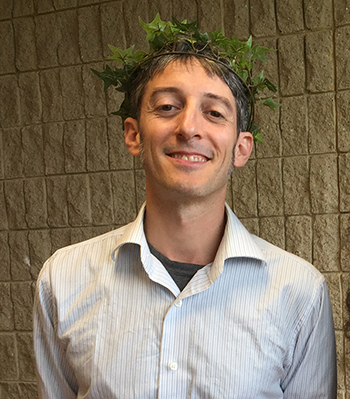Interview with Professor Jonah Radding
January 29, 2019
 We interviewed Jonah Radding about his new class "Oral Poetry from Homer to Hip-hop." Below is a transcript of that interview.
We interviewed Jonah Radding about his new class "Oral Poetry from Homer to Hip-hop." Below is a transcript of that interview.
First, I want to ask what initially peaked your interest in the study of classics and when and how did it become the subject you knew you wanted to pursue?
Mostly by happenstance, really. I started out as a philosophy major as an undergrad, and since I was interested in Plato I started studying ancient Greek. After about three months I began to study Latin as well. It didn't’t take me long to figure out that I liked the classical languages more than philosophy itself!
What are some of your favorite topics, readings or subjects within the Classics field? Why are they your favorite?
Hmm. I think to some extent it changes, depending on what I’m teaching or researching at the moment, so right now I’m teaching Greek history and I’ve been reading a lot about using received oral traditions to reconstruct the past. The intersections of politics and poetry in the ancient Greek world has been a long-standing area of interest for me, and part of that is because it shows how poetry, literature, and art more broadly help us illuminate and (re)consider the societies in which the Greeks lived. That’s something that’s just as true for our own societies, in my opinion.
In your opinion which Classical topic or text would you have everyone engage with at least once in their lifetime? Why?
Well, it’s hard to pick just one! So I’ll pick three: Homer and Sophocles for the manner in which they articulate the human experience so poignantly, but in an idiom that is so distinct from our own. But also Catullus, for the breadth of styles, subjects, and moods that he is able to accommodate in such a small corpus.
When you draw the connection between ancient improvised oral poetry and the modern form of free style hip hop, how consistent is the presence of the art form throughout history? Does the tradition ever pause before reappearing again?
Generally speaking, oral poetry has always been present throughout human cultures, but to varying degrees at different places and times. The drive to create poetry seems to be a universal element of the human experience, and for most of the history of the world oral compositions were the only means of doing so. What we know suggests that a certain amount of improvisation is deeply ingrained in both the creation and the transmission (though the two processes differ very little) of these poetic traditions.
Increased literacy and access to writing materials certainly caused a shift in the type of poetry produced, moving it from oral to written. But that doesn’t mean that oral poetry disappears. The historical record suggests oral poetry was the main poetic medium in the Greek world in the 9th century BCE, but that by the 5th century, fixed, written compositions had become mainstream in popular culture. But just because improvised oral poetry is no longer represented in the sources which we possess doesn’t mean it wasn’t happening. For example, there were vast traditions of work songs in the ancient Greek world, about which we know very little, and which were clearly orally transmitted. Given that this poetry was part of the fabric of countless peoples’ lives, it seems likely that a fair amount of improvisation took place within the medium. Songs like these were one of the few means available for many people to occupy and entertain themselves during what must have been long hours of tedious and repetitive labor. There’s no reason to believe everyone would be satisfied performing the same versions of the same songs day after day.
Nowadays literacy and access to writing is probably the highest it has been in human history, but we still see improvisational oral poetry being produced, as for example with freestyle rap, but also certain regional Italian folk genres, to name just two.
Is there a sense of what it is about the improvised oral poetry that spans cultures and time period and stay with us today?
I think it just comes from something that resides deeply within us! It’s clear that we humans have a natural drive to produce art, whether that be painting, poetry, music etc. In some cases that artistic production is meticulously planned or results in permanently recorded works that are (by and large) fixed. But I think that there is a certain joy that comes from the very spontaneity that occurs at the moment of creation. I have a three-year-old, and I hear her making up rhyming lyrics to herself all the time just for fun, and I think this is a pretty common phenomenon. Which makes sense! We humans like to play and invent, and language is a fantastic – and free! – tool for doing both of these things at once. Now, obviously not everyone has either the talent or inclination to become a Homeric poet or a freestyle rapper, but for those that do, and who find themselves in a cultural situation in which that craft is both appreciated and where teachers (i.e. practitioners) are available, I think it’s inevitable that oral poets will continue to flourish.
